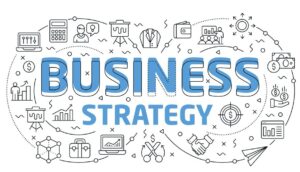Different businesses have different goals & objectives; each business takes different pathways to accomplish them. These pathways constitute Business Strategies. It sounds simple, doesn’t it? But it is not an easy task to successfully execute a Business Strategy.
What is a Business Strategy?
Business Strategy refers to the actions & decisions taken by the organization to reach its set goals & get close to its vision, to be able to secure a competitive position in the industry. It determines what the organization needs to do to reach its next best level, which can directly impact the growth & decision-making process.
Business Strategy is like the backbone of a business & is structured in form of a roadmap that is designed by & for the key stakeholders of any business. Any gaps in the strategy might impact the organization negatively & may even result in huge monetary setbacks for the organizations.

Importance of Business Strategy
With more & more organizations (especially start-ups) entering into the market, the act of Strategizing the next steps plays a vital role, in order to sustain & grow. Here are a few reasons why business strategy is essential:
- Planning – Business strategy is one of the key elements of a Business plan. A business plan sets the expectations, agenda & gives clarity of the bigger picture, while the Strategy presents you with a way to achieve these with specific action steps. It’s a plan to get to where you plan to
- Strengths & Weaknesses – Creating a Business Strategy helps you in identifying a Business’ strong points & areas of improvement. The strengths will help you create an effective strategy that will enable overcoming or eliminate your
- Efficiency & Effectiveness – During the course of building the strategy, you get to plan every Here resource is allocated & everyone has the details of what to be done. Efficiency measures the success of the process, whereas effectiveness measures the contributions your strategies have made to the business. Hence, both are equally important.
- Control/Authority – It not just gives you clarity but also provides scope to transfer the right amount of responsibility & authority to control, as well as effectively measure all the activities you perform to reach your goals/objectives.
- Competitive advantage – By building a strategy, you get a chance to compare your market standing & projected future growth based on your existing, former & potential competitors. You can focus on your strengths, work on the gaps & alter if you feel something is not This also helps you in building a unique & highly effective, scalable strategy.
What are the Components of a Business Strategy?
- Mission, Vision & business objectives
- Core values
- SWOT analysis
- Tactics
- Resource Procurement & Allocation Plan
- Measurement
Mission, Vision & business objectives – The main aim of the strategy is to fulfill the goals/objectives of a business. The clearer thought through & measurable the mission, vision & objectives the better it would be to execute & scale further. It helps you in creating a clear action plan on what needs to be done & whatnot.
Core Values – This states the Do’s & Don’ts of the business which gives a clear direction to the senior level management & to all the departments. Core values help you in sticking to your vision & mission, keeping the purpose of the organization in mind. This way you ensure you do not lose track while making important decisions.
SWOT Analysis – SWOT stands for Strengths, Weaknesses, Opportunities & Threats. This is an integral part of every business strategy. It has proven to show the mirror & surface many blind spots for various businesses & leaders.
You can also use Porter’s Five Force Model for understanding the competitiveness of your business environment & to identify your strategy’s potential profitability. When you understand the forces in your business industry, you will alter/adjust the strategy accordingly to ensure no flaws.
Tactics – What also matters is how the work is being done? The process plays a very significant role in getting the work done in an effective & efficient way. It is very important for us to get deep into the operational duties, impart authority, project timelines, manage resource allocations & expectations.
Resource Procurement & Allocation Plan – an effectively put forth strategy answers where & how will you procure the essential/required resources. How will it be allocated & who will be responsible for handling the resources? This ensures no confusion & complete accountability, thus reducing chances of gaps & errors.
Measurement – Every strategy has to include metrics, the way of measuring results/outcomes of any business. It is important to track the output, analyze & learn from past mistakes/errors.
“Business Strategy is the battle plan for a better future.” – Patrick Dixon

